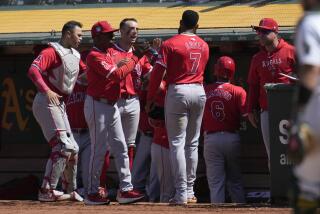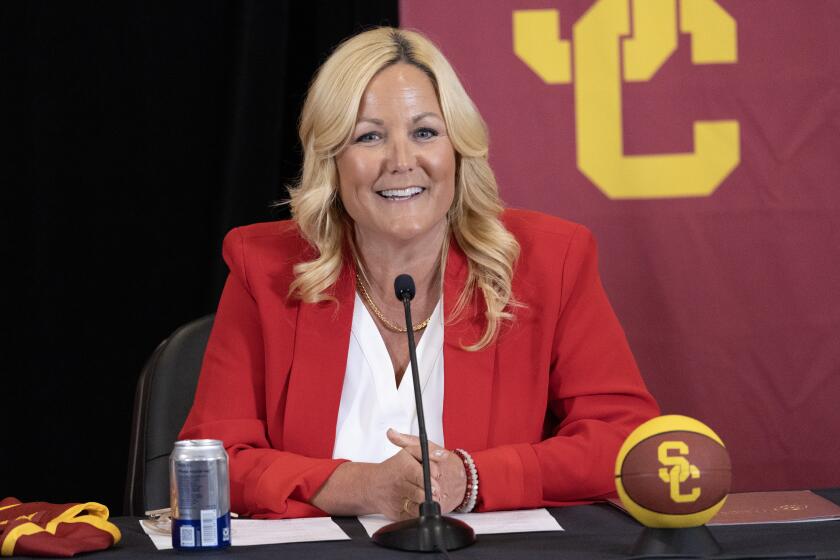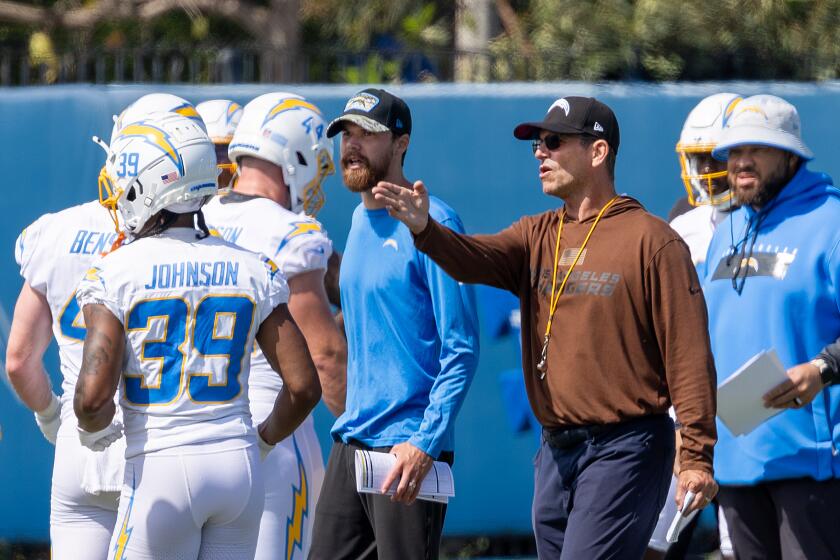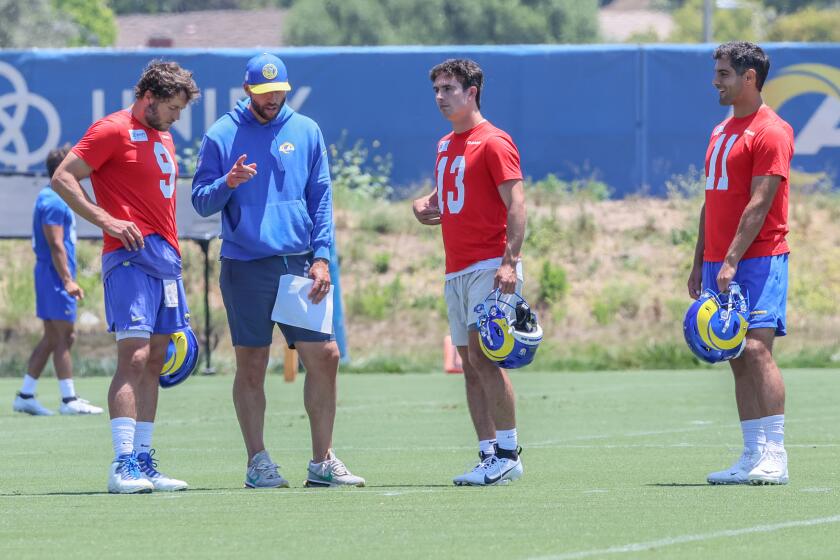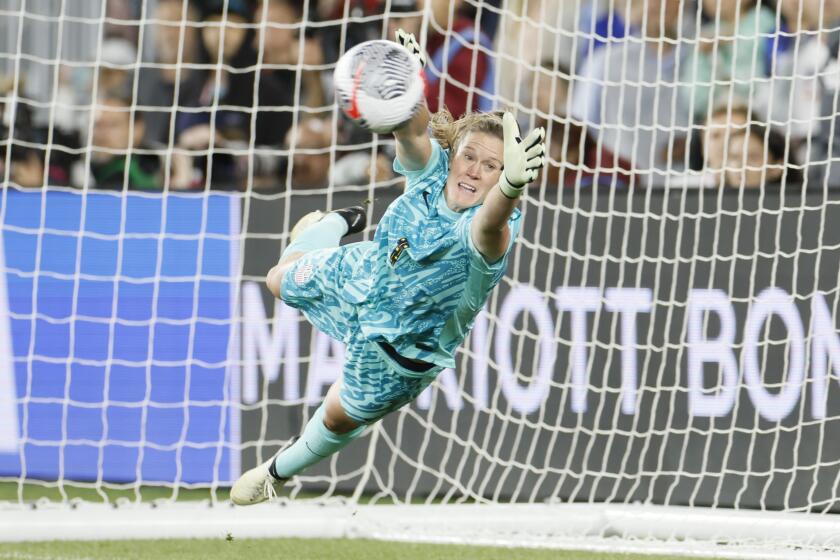For 49ers, Beating the Cap Is a Game Within a Game
Somehow, the San Francisco 49ers found room under the salary cap to add all the players they wanted--and then some.
All of this while dropping annual player costs a staggering $16 million from last year’s $50 million peak.
Despite the supposed restraints of the $34.6 million cap, the 49ers remade their defense and filled gaps on their offensive line to position themselves for a Super Bowl run.
In the process, they have raised eyebrows, not to mention suspicions around the league. Club president Carmen Policy says no financial trickery was involved in assembling the team’s all-star cast. It was simply a matter of dollars and sense, and players exercising their freedom of choice.
Still, the complaints intensified after the Sept. 15 signing of cornerback Deion Sanders, who already reigns as the crown jewel among San Francisco’s eight key free-agent acquisitions, six of whom have been to the Pro Bowl.
Sanders agreed to a one-year, $1.1 million contract along with the chance for $750,000 in incentives. The 49ers also hold an option for next year but cap constraints would make it impossible for them to exercise it, thus guaranteeing Sanders unrestricted free agency in 1995.
Sanders rejected more lucrative offers from New Orleans, Miami, Detroit, and his former team, the Atlanta Falcons, and both Saint owner Tom Benson and Falcon president Taylor Smith have questioned whether the 49ers were somehow fudging figures to stay under the cap.
Policy said every one of the 49ers’ contracts passed muster with the NFL management council, which polices the salary cap.
“We are under surveillance 24 hours a day. The authorities in New York have us watched, they’re following us. They probably have our phones tapped,” Policy said. “So if we’re going to commit a crime, this is not the most ideal circumstance under which to plot and commit it. So, I take a little offense at their suggestions. It’s unfair besmirching.”
Free agent cornerback Toi Cook, who left the Saints for a lower-paying job with the 49ers, said the complaints by Benson and other team executives are without merit.
“When I talked to (the Saints), they didn’t have any money,” Cook said. “When Rickey (Jackson) talked to them, they didn’t have any money. They made Eric Martin take a pay cut. But then they come up with a four-year, $17 million offer for Deion, so you tell me who’s fudging figures.
“It’s a business, OK? The 49ers have figured out how the cap works. You know, it’s funny how all the people complain about the salary cap but then they come up with money when they need it, even the 49ers. I just think in a couple of years you might be seeing something like collusion because, hey, you’re now finding out teams do have the money and can afford to spend it. It’s all in how you run your business.”
Count Dallas owner Jerry Jones among those who don’t like the 49ers’ way of doing business.
He doesn’t think the 49ers are cheating. He just thinks they’re being short-sighted by giving some players incentive-laden contracts with low base pay.
Jones has said the 49ers have sacrificed long-term stability for short-term gain. He says once those incentives start kicking in next year there’s no way of keeping the team together.
Ridiculous, Policy shot back.
“I can tell you there are at least 10 and probably 12 teams in the NFL that have deferred more money into the future than the 49ers,” he said. “So, if we’re mortgaging the future, we’re in the middle of the pack.”
Just what have the 49ers done to rankle their competitors?
Well, two days before signing Sanders, the 49ers were $21,000 under the cap. Earlier, Policy dropped out of the running for Sanders, saying cap constraints made it impossible to compete for his services.
Policy said San Francisco did an about face when Sanders dropped his insistence on a multiyear package and agreed to take a one-year deal.
Still, San Francisco had to field a respectable offer so they gained $1.3 million under the cap by restructuring the contracts of linebackers Gary Plummer and Ken Norton and strong safety Tim McDonald.
The 49ers also waived second-year players Artie Smith and Adrian Hardy, giving them enough money to sign both Sanders and Charles Mann, another former Pro Bowler released by the Washington Redskins earlier this year.
The working of the salary cap and aggressive free-agency plunge really had its roots in the free-agency loss of defensive tackle Pierce Holt to Atlanta following the 1992 season.
“That was a serious, serious lesson, one that we’ll never forget,” Policy said. “When we lost Pierce Holt, that set us reeling.”
Policy determined that the 49ers could, as it were, beat the cap by signing the team’s key players before they could become free agents and before implementation of the cap this season.
So, last fall Policy went to club owner Eddie DeBartolo and told him he needed another $10 million. DeBartolo forked over the dough and the signings began in earnest.
Last year’s payroll swelled to over $50 million but the club kept its top-ranked offense together, re-signing such players Jerry Rice and John Taylor, tight end Brent Jones, tackles Harris Barton and Steve Wallace, and guards Jesse Sapolu and Ralph Tamm. Steve Young was signed to a five-year, $26 million deal prior to the 1993 season.
To cushion the impact of those signings, the 49ers front-loaded those contracts, raising the players’ 1993 salaries and lowering their pay in cap years.
Those tactics gave the 49ers maneuvering room to bid on free agents and in effect prevented other teams from raiding their roster.
“Who were they going to go after?” Policy asked. “We were able to protect ourselves during our most vulnerable year.”
Instead, the 49ers went shopping, picking up Plummer, Norton, Richard Dent, then Bart Oates, Rickey Jackson, Cook and finally Mann and Sanders.
They also drafted and signed a pair of first rounders in defensive tackle Bryant Young and fullback William Floyd.
Whenever the 49ers bumped up against the cap, they would tinker with contract clauses to get back under. San Francisco put together the five-player practice squad only after Jerry Rice, Ricky Watters and McDonald agreed to either forgo or revise incentive clauses worth $270,000.
“A lot of what we did wouldn’t have been possible without the cooperation of the players,” Policy said, estimating the club has in one way or another adjusted the contracts of 16 of the club’s 22 starters.
“Everybody has the ability to do what we did,” club owner Eddie DeBartolo said. “But maybe they’re satisfied with their rosters.”
“I will say this,” added Policy. “There are absolutely no more rabbits left in the hat. What you see out there on the field is what you get.”
More to Read
Go beyond the scoreboard
Get the latest on L.A.'s teams in the daily Sports Report newsletter.
You may occasionally receive promotional content from the Los Angeles Times.

